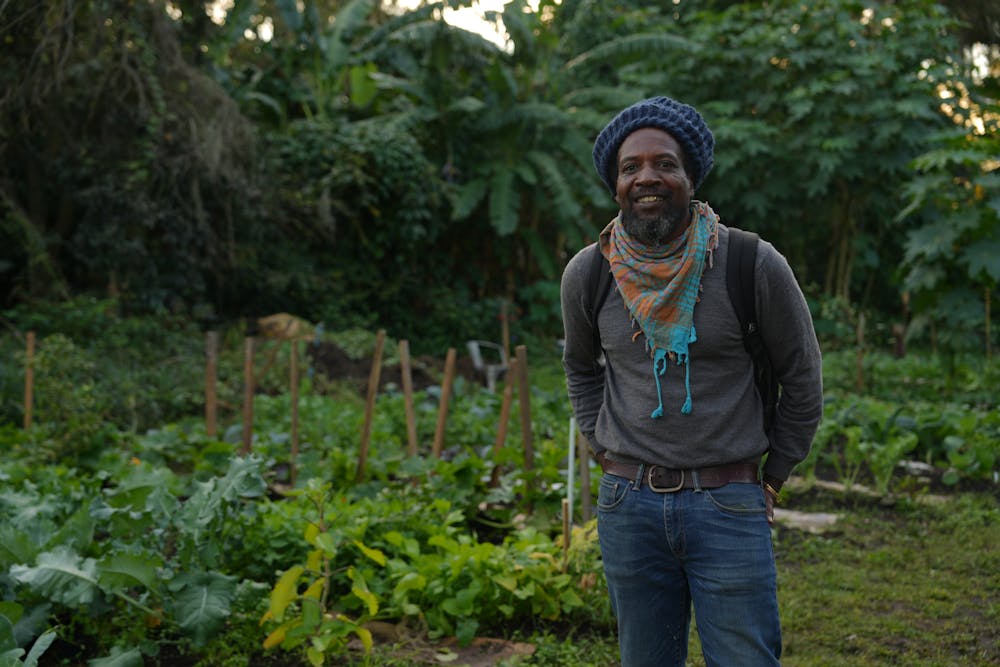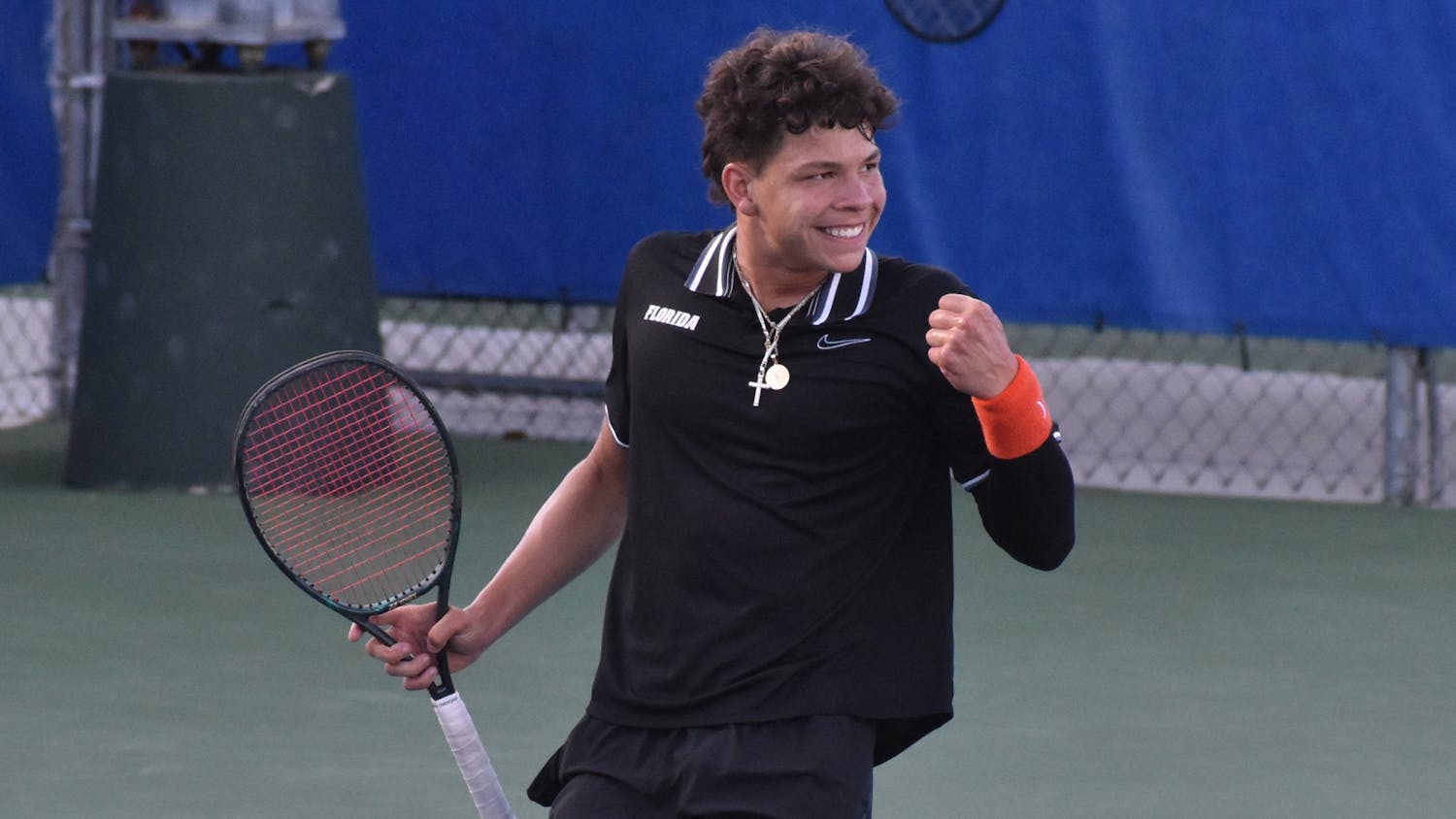In an unsuspecting intersection of streets near Downtown Gainesville, an empty plot of land used to lie across the Porter’s Quarters Community Center. Today, the plot serves as a community farm that grows fresh crops for residents.
Otis Garrison, the 55-year-old Porter’s Quarters Community Farm head farmer, views the farm as an investment in the neighborhood’s future and self-sufficiency. He aspires to grow a variety of produce, including pears, pomegranates, castor oil and avocado.
“As time goes on, you won’t even have to bring a lunch out,” Garrison said.
Porter’s Quarters was started based on this same idea of self-sufficiency, Garrison said. In 1884, Canadian physician Dr. Watson Porter founded the community and only sold real estate to African Americans, according to a 2018 UF architecture project. While the historically Black community used to span a wide area, it has shrunk in size over the years due to development projects.
What’s left is a tight-knit community that is wary of outsiders.
The community farm, which has been in the works since 2012, serves as an effort to combat food insecurity and generate an income for Porters. It also works as a space for the community to come together and work toward bettering their lives, without aid from external organizations. Local activists, farmers and community members appreciate the work on the farm but are painfully aware of how long the road ahead is to defeating food insecurity in their community.
Growing up in High Springs, Garrison said he never thought of himself as a farmer. It wasn’t until 2016 when he joined a Pan-African growing organization in Atlanta that he developed a passion for the power of agriculture.
Teaching the community to grow their own food will help local food-insecure residents overcome the impracticality of our current food systems, he said, because situations like the coronavirus pandemic can bring them to a halt. Not only are the crops from the farm for sale, he said, but they are also for teaching the people how to preserve food through dehydration, pickling, jarring and canning.
“We want to be an example [that] this community and more of our communities are capable to take care of our own business,” Garrison said.
The farm’s impact
Erinesha Hamilton, a 30-year-old social activist, owns the nonprofit organization Sliick Garden, which works with the Porters community farm. She wanted to partner with the farm because she believes it’s the blueprint for what she hopes to see in other historically Black communities.
“My initiative is to really get a curriculum going in agriculture to make it sustainable,” Hamilton said.
However, to expand the initiative to other neighborhoods like Duval and Sugar Hill, they will need extensive financial support, Hamilton said.
“We work for no compensation so the more we can get funds in to take care of our team and take care of resources we need here,” Hamilton said. “We’re looking at the community for help.”
In partnership with Santa Fe College, UF’s Institute of Food and Agricultural Sciences and other organizations, the community organizers behind the farm — including Hamilton — recently hosted a Thanksgiving Harvest Festival to celebrate local agriculture Nov. 18.
The festival featured youth activities, a bounce house, a crockpot cookoff with produce harvested from the farm, workshops on canning and jarring food and more to bring the residents together.
Hamilton said she loved seeing the community unite to enjoy the farm.
“We’ve heard different testimonials that showed us we reached the community in the capacity we need to continue that work and show them this is a safe space,” Hamilton said.
The farm also serves to uplift and empower local farmers. While there is only one farmer living and working on the farm at this time, Hamilton said she hopes to expand the team.
Benefits of urban farming
One advantage of community and urban farming initiatives, like the Porter’s Quarters farm, is the independence they provide communities from harmful food systems.
The rapid urbanization of Florida has led to the use of traditional farming land to build homes, said Catherine Campbell, IFAS assistant professor and extension specialist in community food systems. This has led to the increasing popularity of urban farming, which is the process of cultivating, harvesting and distributing food in urban areas.
Specifically in limited-resource communities, Campbell said, urban farming can help community members have control and sovereignty over their access to food. It can also support community empowerment, she added.
“It’s a way that they can jointly as a group solve their own problems rather than having external people come in and try to solve problems for them,” Campbell said.
Campbell said the UF IFAS Extension does not go directly into communities. Instead, the department provides science-based information and resources to help communities achieve their goals.
Distrust within Black communities
The self-sufficient aspect of urban farming is also beneficial for Porter’s Quarters because community members don’t have a strong trust relationship with the university or the city.
Faye Williams, a 70-year-old community organizer known to many as the “president” of Porter’s Quarters, was one of the people who came up with the idea to turn the unused plot of land into a community farm.
“I said, ‘We need to use that land’ … so we started growing greens and crops of sweet potato,” Williams said. “We got a couple of volunteers from the university and it was good because we were forming a relationship”
However, she said there is a lot to be done about cynicism in the neighborhood.
Roughly 15-20 resident and college student volunteers used to help with the farm’s weekly upkeep. But after some volunteers tried to collect data from community members to improve the farm’s resources, neighbors became wary and stopped visiting the farm, Williams said.
Williams pointed to the fence and lock all around the farm to explain how it feels like there is a barrier between the farm and the community.
“You’ve got the greens on the inside, but you got the people on the outside,” Williams said. “So, it’s gonna take some time to get them to come back over here.”
She said a lot of community members, including herself, are also skeptical of people involved with UF attempting to assist with the farm as the university has a history of taking away from and ignoring the historically Black neighborhoods of Gainesville.
On her morning walks, Williams said she often stops at the farm for 15 to 20 minutes, takes in the fresh air and meditates.
People regularly ask Williams why she continues dedicating her time to the prosperity of Porter’s Quarters. She said those people don’t understand the connection residents can have with their community.
“I’m a poor woman, but I’m rich inside,” Williams said. “And nobody can take that away from me.”
Contact Valentina Sandoval at vsandoval@alligator.org. Follow her on Twitter @valesrc.
Valentina Sandoval is a fourth-year journalism major and the Summer 2024 Engagement Managing Editor. Whenever she's not writing, she's expanding her Animal Crossing island, making Spotify playlists or convincing someone to follow her dog on Instagram.






